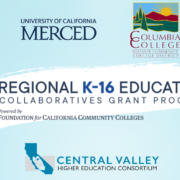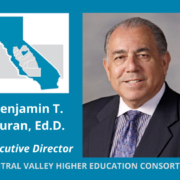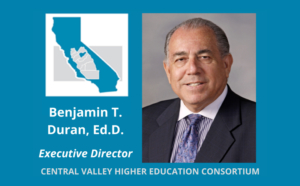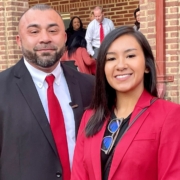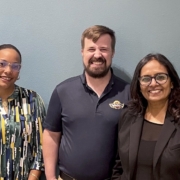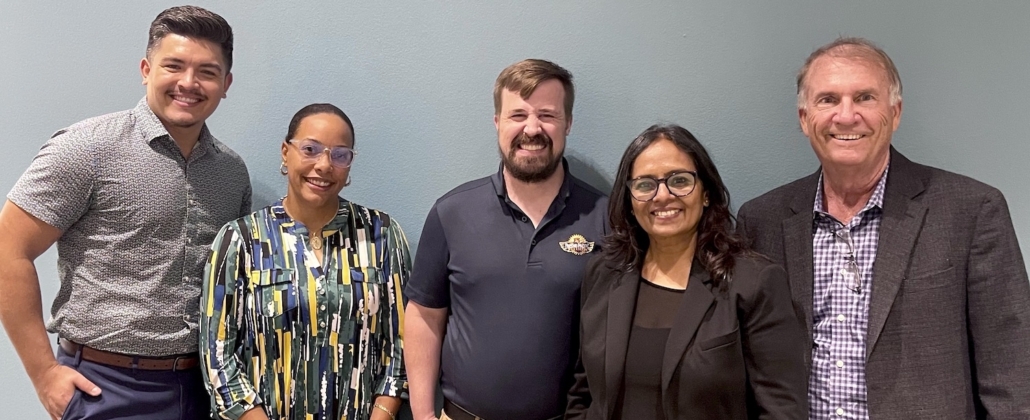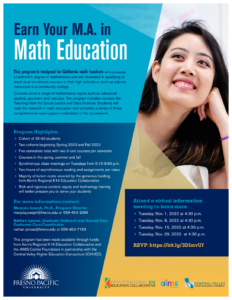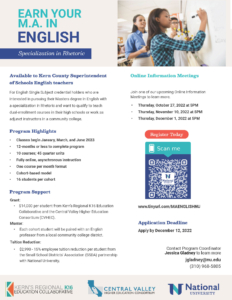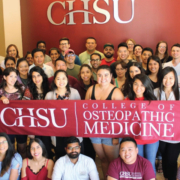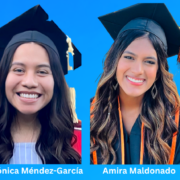State Planning Grants Could Lead to Expansion of CVHEC’s Dual Enrollment Initiatives
Two more Central Valley regions – North San Joaquin and Eastern Sierra – have each been awarded $250,000 state planning grants for the establishment of Regional K-16 Education Collaboratives Grant Programs as part of the statewide drive to strengthen the K-16 education-to-career pipeline. Both collaborative efforts are headed by Central Valley Higher Education Consortium member institutions.
The Department of General Services announced Nov. 9 that the state is awarding the planning grants to the two Central Valley regions as well as the Bay Area and the Central Coast for a total of $1 million. The one-year planning grants will help establish the collaboratives in those areas which will eventually seek additional funding to provide more streamlined, equitable pathways that can help local students transition from high school to college or career training and into the workforce.
In the Northern San Joaquin Region, the University of California, Merced is the lead agency for the newly formed North Valley tri-county Workforce and Education (WE Will!) Regional Collaborative that includes four other fellow CVHEC-members: Merced College, Modesto Junior College, San Joaquin Delta College and California State University, Stanislaus.
They are working in collaboration with partners from Merced, Stanislaus and San Joaquin counties through the WE Will! Collaborative.
For the Eastern Sierra Region, CVHEC-member Columbia College is heading up the K-16 collaborative planning along with several school districts, colleges and employer groups.
These partners will use the planning year to establish their collaborative and to apply together for up to $18 million in state funds available to the region for a three-year “cradle-to-career” pathway project.
These allocations amount to a total of four such collaboratives involving CVHEC members that will help bolster dual enrollment initiatives like the consortium’s successful Master’s Upskilling Program that has already been implemented in the mid valley region through the Fresno-Madera K-16 Collaborative and in the south valley area through the Kern K-16 Collaborative.
The program recruits and helps fund tuition for high school math and English teachers to earn a Master’s so they can teach dual enrollment courses in those subjects on the high school campus.
Dr. Benjamín Durán, CHVEC executive director, said the south and mid valley efforts have laid a solid foundation for the program to succeed when scaled and replicated in the North Valley and Eastern Sierra regions to better serve all Central Valley students.
“As we continue to equitably expand dual enrollment efforts in the Valley, we know one of the barriers for high school teachers to teach these classes is the lack of a master’s degree,” said Duran, president-emeritus of Merced College who was named to lead CVHEC in 2016. “With the new formation of both the WE Will! Regional Collaborative and the Eastern Sierra collaborative with this latest state funding, we will be able to expand our efforts throughout the Valley to increase dual enrollment opportunities for our students.”
In its announcement Nov. 7, UC Merced said the WE Will! Regional Collaborative – which was formed “to address streamlining and accelerating students preparing to enter the priority industry fields that would better serve our region, students and families” — will use the year to assess, design and create a work plan for the phase two application in the fall of 2023, which will be over $18 million.
“UC Merced is committed to helping break workforce barriers,” said Chancellor Juan Sánchez Muñoz who serves on the CVHEC Board of Directors that is made up of the presidents and chancellors of its 30 consortium members from San Joaquin to Kern counties.
“The WE Will! Collaborative between our campus and surrounding counties will be an essential pipeline to build a more equitable future for all students and provide the resources they need to reach their career goals,” the UCM chancellor said.
Dr. Ellen Junn, Stanislaus State president and CVHEC board member, said, “As the California State University serving this region, Stan State is committed to preparing our graduates to address and meet the needs of our regional workforce. We are dedicated to working collaboratively to aggressively pursue equity and diversity in degree and credential attainment as we work to ensure the best possible preparation for student success in the workforce.”
WE Will! provides collaboration between all education partners and the workforce to design ways for students to experience connected learning experiences, acceleration opportunities and successful transition into locally available careers.
“We know employers don’t stop at the county border when they are expanding,” said San Joaquin Delta President Lisa Aguilera Lawrenson, also a CVHEC board member. “We are looking forward to collaborating with our workforce partners and educational partners to get beyond the ‘border’ and plan for the region. Together we can provide a workforce for the needs of today and the future.”
The Eastern Sierra project will also include UC Merced and Stanislaus State as well as K-12, postsecondary, and industry partners, including the superintendents of schools in each participating county, several K-12 districts; and workforce investment boards, including Mother Lode Job Training. Those counties are Tuolumne, Calaveras, Amador, Mariposa, Alpine, Inyo and Mono.
“This is the first step toward a very exciting opportunity for our rural counties,” said Dr. Lena Tran, Columbia College president who is also on the CVHEC Board.
“We are very honored to serve as the lead for a project that will be designed specifically by and for our rural mountain communities. This planning year gives us a chance to build our collaborative and find what works for our students, our schools, and our employers.”
Earlier this year, the state awarded full implementation grants to the Central San Joaquin Valley and Kern County, as well as the North State, Redwood Coast, Orange County, Sacramento, Los Angeles, Border and Inland Empire regions totaling approximately $163 million.
The state grant was awarded through the 2021 Budget Act, which allocated $250 million to the Department of General Services and is being administered through the Foundation for California Community Colleges.
See the UC Merced press release (includes a full list of WE WILL partners) and Columbia College press release.
For CVHEC media inquiries contact Tom Uribes: tom@uribes.com (559.348.3278)
For UC Merced media inquiries, contact PIO Desiree Lopez: dlopez298@ucmerced.edu (209.746.5137)
 “The Board of Trustees are grateful to the search committee whose commitment to the District’s values of academic excellence, diversity, equity, and inclusion was evident throughout the process,” said Board President Nasreen Johnson.
“The Board of Trustees are grateful to the search committee whose commitment to the District’s values of academic excellence, diversity, equity, and inclusion was evident throughout the process,” said Board President Nasreen Johnson.

